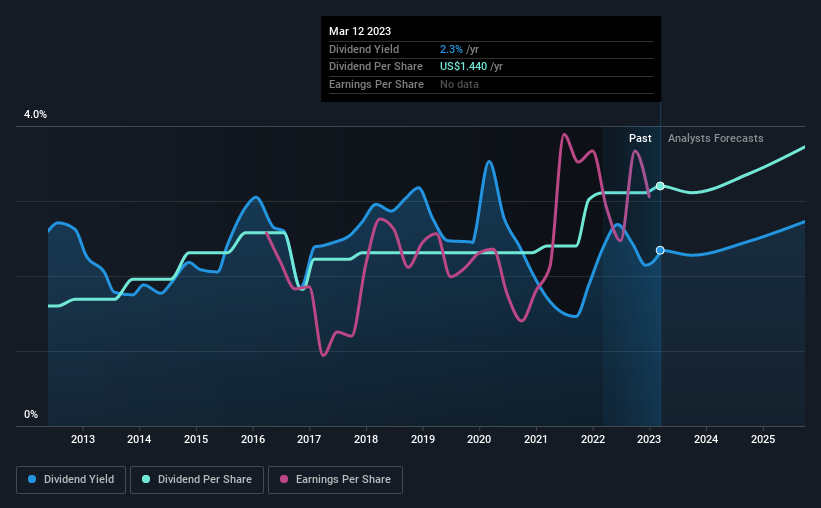Read This Before Considering Johnson Controls International plc (NYSE:JCI) For Its Upcoming US$0.36 Dividend
Regular readers will know that we love our dividends at Simply Wall St, which is why it's exciting to see Johnson Controls International plc (NYSE:JCI) is about to trade ex-dividend in the next 4 days. The ex-dividend date occurs one day before the record date which is the day on which shareholders need to be on the company's books in order to receive a dividend. It is important to be aware of the ex-dividend date because any trade on the stock needs to have been settled on or before the record date. Therefore, if you purchase Johnson Controls International's shares on or after the 17th of March, you won't be eligible to receive the dividend, when it is paid on the 14th of April.
The company's next dividend payment will be US$0.36 per share, and in the last 12 months, the company paid a total of US$1.40 per share. Based on the last year's worth of payments, Johnson Controls International stock has a trailing yield of around 2.3% on the current share price of $61.46. Dividends are a major contributor to investment returns for long term holders, but only if the dividend continues to be paid. As a result, readers should always check whether Johnson Controls International has been able to grow its dividends, or if the dividend might be cut.
Check out our latest analysis for Johnson Controls International
If a company pays out more in dividends than it earned, then the dividend might become unsustainable - hardly an ideal situation. Its dividend payout ratio is 76% of profit, which means the company is paying out a majority of its earnings. The relatively limited profit reinvestment could slow the rate of future earnings growth. It could become a concern if earnings started to decline. A useful secondary check can be to evaluate whether Johnson Controls International generated enough free cash flow to afford its dividend. Johnson Controls International paid out more free cash flow than it generated - 136%, to be precise - last year, which we think is concerningly high. It's hard to consistently pay out more cash than you generate without either borrowing or using company cash, so we'd wonder how the company justifies this payout level.
Johnson Controls International paid out less in dividends than it reported in profits, but unfortunately it didn't generate enough cash to cover the dividend. Cash is king, as they say, and were Johnson Controls International to repeatedly pay dividends that aren't well covered by cashflow, we would consider this a warning sign.
Click here to see the company's payout ratio, plus analyst estimates of its future dividends.
Have Earnings And Dividends Been Growing?
Companies with consistently growing earnings per share generally make the best dividend stocks, as they usually find it easier to grow dividends per share. If earnings decline and the company is forced to cut its dividend, investors could watch the value of their investment go up in smoke. It's encouraging to see Johnson Controls International has grown its earnings rapidly, up 21% a year for the past five years. Earnings have been growing quickly, but we're concerned dividend payments consumed most of the company's cash flow over the past year.
Another key way to measure a company's dividend prospects is by measuring its historical rate of dividend growth. In the last 10 years, Johnson Controls International has lifted its dividend by approximately 7.2% a year on average. It's encouraging to see the company lifting dividends while earnings are growing, suggesting at least some corporate interest in rewarding shareholders.
Final Takeaway
Should investors buy Johnson Controls International for the upcoming dividend? The best dividend stocks typically boast a long history of growing earnings per share (EPS) via a combination of earnings growth and buybacks. So, you might think that Johnson Controls International buying back stock, growing its EPS, and retaining profits within its business is a good combination. However, we note with some concern that it paid out 136% of its free cash flow last year, which is uncomfortably high and makes us wonder why the company chose to spend even more cash on buybacks. Overall, it's not a bad combination, but we feel that there are likely more attractive dividend prospects out there.
With that being said, if dividends aren't your biggest concern with Johnson Controls International, you should know about the other risks facing this business. Be aware that Johnson Controls International is showing 4 warning signs in our investment analysis, and 1 of those is a bit unpleasant...
If you're in the market for strong dividend payers, we recommend checking our selection of top dividend stocks.
Have feedback on this article? Concerned about the content? Get in touch with us directly. Alternatively, email editorial-team (at) simplywallst.com.
This article by Simply Wall St is general in nature. We provide commentary based on historical data and analyst forecasts only using an unbiased methodology and our articles are not intended to be financial advice. It does not constitute a recommendation to buy or sell any stock, and does not take account of your objectives, or your financial situation. We aim to bring you long-term focused analysis driven by fundamental data. Note that our analysis may not factor in the latest price-sensitive company announcements or qualitative material. Simply Wall St has no position in any stocks mentioned.
Join A Paid User Research Session
You’ll receive a US$30 Amazon Gift card for 1 hour of your time while helping us build better investing tools for the individual investors like yourself. Sign up here

 Yahoo Finance
Yahoo Finance 
